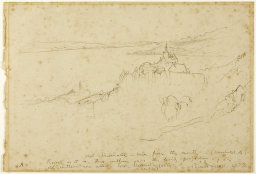Institute history and mission
History
Beginning in the eighteenth century, Neuchâtel has attracted a significant number of English-speaking travellers, artists and writers. The Shelleys passed through in 1814, for example, and the Victorian critic and artist John Ruskin visited ten times, drawing over twenty views of the town and its surroundings. English was first taught at the university in 1870.
Until 1900, courses were given by a colorful series of expatriates, including the Reverends J.W. Coombs and Barry O'Meara Deane. In the first half of the twentieth century, several distinguished scholars and noteworthy personalities held lectureships or chairs in English literature: the pioneer Alpine historian Claire-Eliane Engel; Edmond Privat, a peace activist and leader of the Esperanto movement; and the renowned Beowulf scholar Adrien Bonjour. Professors who have belonged to the institute in the last three decades include François Matthey, George Denis Zimmerman, Pierre-Eric Monnin, Jenny Cheshire, Kenneth Graham, and David Spurr. Today, English is one of the most popular majors in the Faculty of Letters and Human Sciences.

John Ruskin, "Old Neuchâtel" (c. 1863), Chicago Art Institute
Institute Mission Statement
Our mission is,
First, to provide our students with education of the highest quality in preparation for a career, for graduate work and to lead rich, intellectually satisfying lives.
Second, to contribute actively to English language and literature scholarship in Switzerland and internationally, by keeping abreast of and contributing to the latest research, establishing links with communities of scholars in various fields and helping to promote our discipline.
Third, to participate in and contribute to the wider community, in particular by organizing activities that help foster a better understanding and appreciation of English as a language and culture, and by developing a close working relationship with area teachers.


